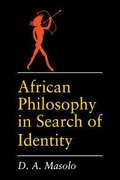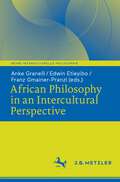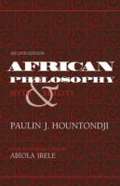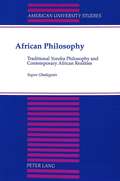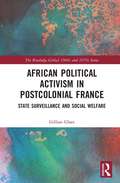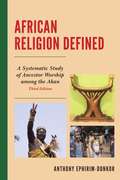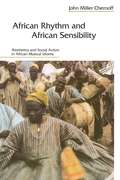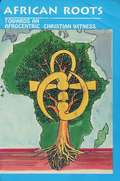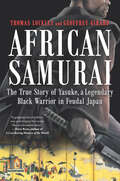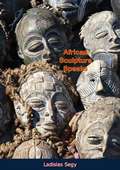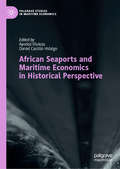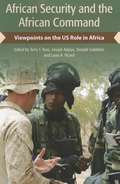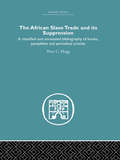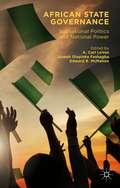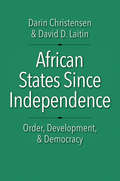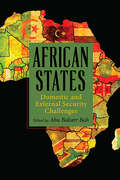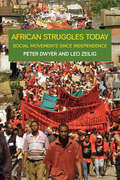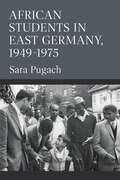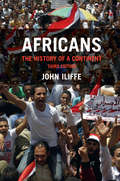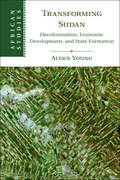- Table View
- List View
African Philosophy in Search of Identity
by D. A. MasoloA Kenyan philosopher surveys themes and debates in African philosophy over the last five decades. Masolo's purview includes Francophone and Anglophone philosophers in both the analytic and phenomenological traditions.
African Philosophy in an Intercultural Perspective (Reihe Interkulturelle Philosophie)
by Anke Graneß Edwin Etieyibo Franz Gmainer-PranzlAfrican philosophy under the specific conditions of a colonial and postcolonial world is – at least since the 20th century if not even earlier – inherently intercultural. The aim and target of the volume is to reveal, interrogate and analyse the intercultural dimension in African philosophy, and to critically interrogate the project of an intercultural philosophy from an African perspective. This volume is the first publication that explicitly discusses African philosophy as a challenge to the project of intercultural philosophy.
African Philosophy: An Anthology
by Emmanuel Chukwudi EzeBringing together canonical philosophical texts from African, African-American, Afro-Caribbean, and Black European thinkers, this major new anthology is designed to serve both as a textbook and as the authoritative reference volume in Africana philosophical and cultural studies.
African Philosophy: Myth and Reality (Second Edition)
by Paulin J. Hountondji Jonathan Ree Henri EvansThis is a precious gem of a book for anyone who wishes to reflect on civilization and culture. --Choice In this incisive, original exploration of the nature and future of African philosophy, Paulin J. Hountondji attacks a myth popularized by ethnophilosophers such as Placide Tempels and Alexis Kagame that there is an indigenous, collective African philosophy separate and distinct from the Western philosophical tradition. Hountondji contends that ideological manifestations of this view that stress the uniqueness of the African experience are protonationalist reactions against colonialism conducted, paradoxically, in the terms of colonialist discourse. Hountondji argues that a genuine African philosophy must assimilate and transcend the theoretical heritage of Western philosophy and must reflect a rigorous process of independent scientific inquiry. This edition is updated with a new preface in which Hountondji responds to his critics and clarifies misunderstandings about the book's conceptual framework.
African Philosophy: Traditional Yoruba Philosophy and Contemporary African Realities
by Segun GbadegesinThe question whether or not there is African philosophy has, for too long, dominated the philosophical scene in Africa, to the neglect of substantive issues generated by the very fact of human existence. This has unfortunately led to an impasse in the development of a distinctive African philosophical tradition. In this path-breaking book, Segun Gbadegesin offers a new and promising approach which recognizes the traditional and contemporary facets of African philosophy by exploring the issues they raise. In Part I, the author examines, with refreshing insights, the philosophical concepts of the person, individuality, community and morality, religiosity and causality, focusing on the Yoruba of Nigeria. Part II discusses, in an original way, contemporary African social, political and economic realities from a philosophical perspective.
African Political Activism in Postcolonial France: State Surveillance and Social Welfare (The Routledge Global 1960s and 1970s Series)
by Gillian GlaesAfrican Political Activism in Postcolonial France engages with several areas of scholarly inquiry, ranging from the study of immigrants to the investigation of surveillance and the legacy of colonialism. Within migration studies, many important analyses have focused on integration, yielding critical contributions to our understanding of immigration and identity. This work moves in a different direction. Factoring in the dynamics of colonialism, decolonization, and their effect on immigrant political activism and state policy in the postcolonial, Cold War era reveals that immigrants from francophone Sub-Saharan Africa were key players who shaped the development of public policy toward immigrants. Through this approach, we can understand how republicanism, colonial ideology, immigration policy, and immigrant political activism intersected in the post-colonial era, shaping the reception of African workers and affecting their lives and experiences in France.
African Political Systems
by E. E. Evans-Pritchard Meyer ForbesAfrican Political Systems is a foundational work in the field of anthropology and political science, edited by Meyer Fortes and E. E. Evans-Pritchard. First published in 1940, the book offers a comparative study of governance structures across various African societies, challenging earlier Western assumptions about political organization in non-Western cultures.Through a series of in-depth case studies, the book explores the diversity of political systems in African societies—ranging from stateless societies with decentralized authority to centralized kingdoms with hierarchical governance. It covers communities such as the Nuer, Zulu, and Bemba, revealing how political order is maintained through kinship ties, rituals, alliances, and local customs. Each chapter demonstrates how these systems reflect the unique cultural, social, and economic conditions of the communities they govern.The editors introduce key anthropological concepts, including the distinction between "primitive" and "modern" political systems, although later scholarship has criticized some of these categories. Nevertheless, African Political Systems remains a pioneering effort in understanding political organization outside the Western context, and it continues to influence research in anthropology, history, and political theory.With its rich ethnographic insights, the book offers readers an invaluable perspective on governance, authority, and social cohesion across Africa, making it an essential text for those interested in cross-cultural political studies.
African Religion Defined: A Systematic Study of Ancestor Worship Among the Akan (3rd Edition)
by Anthony Ephirim-DonkorThis edition updates the scholarship on ancestor worship--with the addition of three new chapters. Beginning with Akan theology and ending with sacrifices, the study examines Akan conception of God, the abosom (gods and goddesses) relative to creation, centrality of the ancestors' stool as the ultimate religious symbol housing the soul of the Akan, and organized annual propitiatory festivities carried out among the Akan in honor of the ancestors (Nananom Nsamanfo) and abosom. The book, therefore, serves as an invaluable resource for those interested in the phenomenon of African religion, because it provides real insight into ancestor worship in ways that are meaningful, practical, systematic, and as a way of life by an Akan Traditional ruler (Ↄdikro) and a professor of Africana studies.
African Religions and Philosophy
by John S. MbitiDiscusses the philosophies, rituals, and ceremonies of various African religions and their influence in the lives of the people.
African Rhythm and African Sensibility: Aesthetics and Social Action in African Musical Idioms
by John M. Chernoff"We have in this book a Rosetta stone for mediating, or translating, African musical behavior and aesthetics." --Andrew Tracey, African Music. "John Miller Chernoff, who spent 10 years studying African drumming, has a flair for descriptive writing, and his first-person narratives should be easily understood by any reader, while ringing unmistakably true for the reader who has also been to West Africa." --Roderick Knight, Washington Post Book World. "Ethnomusicologists must be proud that their discipline has produced a book that will, beyond doubt, rank as a classic of African studies." --Peter Fryer,Research in Literatures. "A marvelous book. ... Not many scholars will ever be able to achieve the kind of synthesis of 'doing' and 'writing about' their subject matter that Chernoff has achieved, but he has given us an excellent illustration of what is possible." --Chet Creider, Culture. "Chernoff develops a brilliant and penetrating musicological essay that is, at the same time, an intensely personal and even touching account of musical and cultural discovery that anyone with an interest in Africa can and should read. ... No other writing comes close to approaching Chernoff's ability to convey a feeling of how African music 'works'." --James Koetting, Africana Journal. "Four stars. One of the few books I know of that talks of the political, social, and spiritual meanings of music. I was moved. It was so nice I read it twice." --David Byrne of "Talking Heads". The companion cassette tape has 44 examples of the music discussed in the book. It consists of field recordings illustrating cross-rhythms, multiple meters, call and response forms, etc.
African Roots: Towards an Afrocentric Christian Witness
by John H. Adams Michael I. Dash L. Rita Dixon Darius L. Swann Ndugu T'Ofori-Atta Zachariah Anderson Rita DixonThis resource will expand our database about our African heritage, help us see the role and contributions of Africa in world culture, motivate us to re-examine some long held stereotypes about African peoples, and move us into the future with a strong pride and hope for the descendants of Africa and the human family. May we forever remember that when one part of the human' family has been dehumanized, the whole family is distorted. Our loving parent, God, is just and faithful, generously giving every branch of the human family good gifts to be used for the liberation and peace of all. In a real sense, this book is about--Identity, the loss of it, the search for it,, the denial of it, the recovery of it. It tells about efforts to appreciate and to affirm identity for a particular ethnic group of this world's peoples. This book is addressed especially to those who are predisposed to engage in this quest for identity and a proper affirmation of it. The curious may be sufficiently interested to contest or challenge those engaged in this search for roots. It is hoped that others who are' indifferent or apathetic may- be aroused by the efforts of the first two groups. So inescapably this is a book for you. This resource seeks to help Christians in general, and African American' Christians in particular, to become more aware of Africa in antiquity, her enormous contributions to other cultures and the depths of the African genius in religion and world culture. It is hoped that each lesson will motivate participants to read more, go deeper than what is offered in this resource. The bibliography is provided as a guide for doing this. In order for African American people to have a healthy and balanced self-love, it is necessary to identify the distortions, to learn a more accurate version of our history, to understand that the experiences in our journey with God are deep, and to teach others, especially our children, so that all of humanity may be transformed by the African presence and contribution to the world. This study resource may be used by individuals or groups. The following groups provide excellent settings: *Family groups *Sunday School Classes *Week-day or night church classes *Retreat settings *Adult Continuing Education Classes *Personal enrichment classes
African Samurai: The True Story of Yasuke, a Legendary Black Warrior in Feudal Japan
by Geoffrey Girard Thomas LockleyThis biography of the first foreign-born samurai and his journey from Africa to Japan is “a readable, compassionate account of an extraordinary life” (The Washington Post).When Yasuke arrived in Japan in the late 1500s, he had already traveled much of the known world. Kidnapped as a child, he had ended up a servant and bodyguard to the head of the Jesuits in Asia, with whom he traversed India and China learning multiple languages as he went. His arrival in Kyoto, however, literally caused a riot. Most Japanese people had never seen an African man before, and many of them saw him as the embodiment of the black-skinned Buddha. Among those who were drawn to his presence was Lord Nobunaga, head of the most powerful clan in Japan, who made Yasuke a samurai in his court. Soon, he was learning the traditions of Japan’s martial arts and ascending the upper echelons of Japanese society.In the four hundred years since, Yasuke has been known in Japan largely as a legendary, perhaps mythical figure. Now African Samurai presents the never-before-told biography of this unique figure of the sixteenth century, one whose travels between countries and cultures offers a new perspective on race in world history and a vivid portrait of life in medieval Japan.“Fast-paced, action-packed writing. . . . A new and important biography and an incredibly moving study of medieval Japan and solid perspective on its unification. Highly recommended.” —Library Journal (starred review)“Eminently readable. . . . a worthwhile and entertaining work.” —Publishers Weekly“A unique story of a unique man, and yet someone with whom we can all identify.” —Jack Weatherford, New York Times–bestselling author of Genghis Khan
African Sculpture Speaks
by Ladislas SegyPABLO PICASSO: “…when the form is realized, it is there to live its own life.”HENRY MOORE: “The sculpture which moves me most is full-blooded and self-supporting, fully in the round; giving out something of an energy and power of great mountains, it has a life of its own independent of the object it represents.”African Art Speaks, the first full appraisal of African art published in the United States, describes and illustrates the sculpted works of more than 150 West African tribes.Ladislas Segy approaches African art from several different but interrelated perspectives, considering the sculptures first as products of a distinct African culture, then as high-quality works of art. Seeking to bring the African carver’s work within the scope of the Western observer, Segy stresses the need for appraising African art within in its own context, suspending established procedures for art appreciation and viewing the object as it actually is, not as we think it is or should be.Bringing to bear the disciplines of aesthetics, anthropology, psychology, and phenomenology, Segy shows how the deep-seated magico-religious beliefs of the tribal carver creates such powerful emotional tension in his work that the viewer can recapture this emotion and identify it as part of his own experience.This present edition is the Third Printing, originally published in 1961, and provides a systematic Style Guide, analyzing the characteristic features of the different styles of tribal sculpture. A special chapter for the collector tells how to buy and care for African art. Segy also discusses the styles of the main sculpture-producing tribes in East and South Africa. Included are maps, a bibliography and a list of illustrations.“While much has been written about African sculpture within recent years, Mr. Segy’s book is undoubtedly among the finest published in this country.”—The San Francisco Chronicle
African Seaports and Maritime Economics in Historical Perspective (Palgrave Studies in Maritime Economics)
by Ayodeji Olukoju Daniel Castillo HidalgoThis book updates African maritime economic history to analyse the influence of seaports and seaborne trade, processes of urbanization and development, and the impact of globalization on port evolution within the different regions of Africa. It succeeds the seminal collection edited by Hoyle & Hilling which was conceived during a phase of sustained economic growth on the African continent, and builds on a similar trend where African economies have experienced processes of economic growth and the relative improvement of welfare conditions. It provides valuable insights on port evolution and the way the maritime sector has impacted the hinterland and the regional economic structures of the affected countries, including the several and varied agents involved in these activities. African Seaports and Maritime Economics in Historical Perspective will be useful for economists, historians, and geographers interested in African and maritime issues, as well as policy makers interested in path-dependence and long-term analysis
African Security and the African Command: Viewpoints on the US Role in Africa
by Terry F. Buss Joseph Adjaye Donald Goldstein Louis A. Picard<p>After the end of the Cold War and a failed mission in Somalia, the US decided to wash its hands of major military operations in Africa. Within the past few years, however, strategic interests in the region have grown, based largely on the threat of international terrorist group activities there. In 2007, the Bush Administration created a new military presence in Africa, AFRICOM (United States Africa Command), professed to be based not on occupying military or fixed bases, but rather on capacity building for and collaboration with African security forces. <p>Some see AFRICOM as the answer to an African security system crippled by a lack of resources, widespread politicization and institutional weakness. Others claim the program is nothing more than a characteristic attempt by the US to secure its own interests in the region without regard to the actual needs of Africans. A variety of viewpoints on the debate, both from the US and Africa, come together in this collection to examine the objectives and activities of AFRICOM. The result provides the reader with a well-rounded picture of longstanding security challenges in Africa and what might be done to address them.</p>
African Slave Trade and Its Suppression: A Classified and Annotated Bibliography of Books, Pamphlets and Periodical Articles
by Peter C. HoggFirst Published in 2005. Routledge is an imprint of Taylor & Francis, an informa company.
African Socialism in Postcolonial Tanzania
by Priya LalDrawing on a wide range of oral and written sources, this book tells the story of Tanzania's socialist experiment: the ujamaa villagization initiative of 1967–1975. Inaugurated shortly after independence, ujamaa ('familyhood' in Swahili) both invoked established socialist themes and departed from the existing global repertoire of development policy, seeking to reorganize the Tanzanian countryside into communal villages to achieve national development. Priya Lal investigates how Tanzanian leaders and rural people creatively envisioned ujamaa and documents how villagization unfolded on the ground, without affixing the project to a trajectory of inevitable failure. By forging an empirically rich and conceptually nuanced account of ujamaa, African Socialism in Postcolonial Tanzania restores a sense of possibility and process to the early years of African independence, refines prevailing theories of nation building and development, and expands our understanding of the 1960s and 70s world.
African State Governance: Subnational Politics And National Power
by A. Carl LeVan Joseph Olayinka Fashagba Edward R. McMahonAfrica is changing and it is easy to overlook how decentralization, democratization, and new forms of illiberalism have transformed federalism, political parties, and local politics. Chapters on Kenya, Nigeria, Ethiopia, and South Africa help fill an important gap in comparative institutional research about state and local politics in Africa.
African States since Independence: Order, Development, and Democracy (Castle Lecture Series)
by Darin Christensen David D. LaitinAuthors Christensen and Laitin argue that an interplay of geographic, historical, and demographic factors undergird sub‑Saharan states’ post‑independence struggles to eradicate poverty, establish democratic accountability, and quell civil unrest. They set out the founding fathers’ challenges in transforming their postcolonial states, many of which are ethnically diverse, geographically diffuse, sparsely populated, and lacking in administrative capacity. With the legacies of the slave trade, partition, Christian missionaries, and extractive colonial institutions complicating their efforts, many African states faced stagnation, authoritarianism, and civil strife. Recent years have seen promising attempts to restore democracy to states under authoritarian rule and to liberalize their economies, suggesting that the region is moving toward a new era. Relying on the best statistical data and richly illustrated with case material, this book is an indispensable source for scholars and policy analysts seeking to understand Africa’s post‑independence political trajectories.
African States: Domestic and External Security Challenges (SUNY series, James N. Rosenau series in Global Politics)
by Abu Bakarr BahEssays on the security challenges faced by African states.The central concern that shapes this edited volume is the nature of the African state. Contributors point to an interesting intersection of domestic and external issues that is framed as a glocalized security situation. Individual chapters shed new insights on conflict drivers through case studies on Sierra Leone, Cameroon, Mali, Nigeria, and Somalia, as well as broader issues on the nature of African states. Arguments pivot on three issues, which show the intersection of the domestic and external forces that render the African state as a glocal problem: (a) the colonial roots of the state, (b) problems of governance, and (c) international and regional security imperatives. By problematizing the African state and connecting the security challenges of African states to colonialism, patrimonial rule, and geopolitical security issues, African States brings forth a new way of examining African states through the notion of glocalized security.
African Struggles Today
by Peter Dwyer Leo ZeiligThree leading Africa scholars investigate the social forces driving the democratic transformation of postcolonial states across southern Africa. Extensive research and interviews with civil society organizers in Zimbabwe, South Africa, Zambia, Malawi, Namibia, and Swaziland inform this analysis of the challenges faced by non-governmental organizations in relating both to the attendant inequality of globalization and to grassroots struggles for social justice.Peter Dwyer is a tutor in economics at Ruskin College in Oxford.Leo Zeilig Lecturer at the Institute of Commonwealth Studies, University of London.
African Students in East Germany, 1949-1975 (Social History, Popular Culture, And Politics In Germany)
by Sara PugachThis book explores the largely unexamined history of Africans who lived, studied, and worked in the German Democratic Republic. African students started coming to the East in 1951 as invited guests who were offered scholarships by the East German government to prepare them for primarily technical and scientific careers once they returned home to their own countries. Drawn from previously unexplored archives in Germany, Ghana, Kenya, Zambia, and the United Kingdom, African Students in East Germany, 1949–1975 uncovers individual stories and reconstructs the pathways that African students took in their journeys to the GDR and what happened once they got there. The book places these experiences within the larger context of German history, questioning how ideas of African racial difference that developed from the eighteenth through the early twentieth centuries impacted East German attitudes toward the students. The book additionally situates African experiences in the overlapping contexts of the Cold War and decolonization. During this time, nations across the Western and Soviet blocs were inviting Africans to attend universities and vocational schools as part of a drive to offer development aid to newly independent countries and encourage them to side with either the United States or Soviet Union in the Cold War. African leaders recognized their significance to both Soviet and American blocs, and played on the desire of each to bring newly independent nations into their folds. Students also recognized their importance to Cold War competition, and used it to make demands of the East German state. The book is thus located at the juncture of many different histories, including those of modern Germany, modern Africa, the Global Cold War, and decolonization.
African Studies Series: The History of a Continent (African Studies #137)
by John IliffeIn a vast and all-embracing study of Africa, from the origins of mankind to the AIDS epidemic, John Iliffe refocuses its history on the peopling of an environmentally hostile continent. Africans have been pioneers struggling against disease and nature, and their social, economic and political institutions have been designed to ensure their survival. In the context of medical progress and other twentieth-century innovations, however, the same institutions have bred the most rapid population growth the world has ever seen. Africans: The History of a Continent is thus a single story binding living Africans to their earliest human ancestors.
African Studies: Decolonization, Economic Development, and State Formation (African Studies #140)
by Alden YoungFollowing the conclusion of the Second World War, the nature of inequality in Africa was dramatically altered. In this book, Alden Young traces the emergence of economic developmentalism as the ideology of the Sudanese state in the decolonization era. Young demonstrates how the state was transformed, as a result of the international circulation of tools of economic management and the practice of economic diplomacy, from the management of a collection of distinct populations, to the management of a national economy based on individual equality. By studying the hope and eventual disillusionment this ideology gave to late colonial officials and then Sudanese politicians and policymakers, Young demonstrates its rise, and also its shortfalls as a political project in Sudan, particularly its inability to deal with questions of regional and racial equity, not only showing how it fostered state formation, but also civil war.
African Studies: Political Identity and Conflict in Central Angola, 1975–2002
by Justin PearceThis book examines the internal politics of the war that divided Angola for more than a quarter-century after its independence. It emphasises the Angolan people's relationship to the rival political forces that prevented the development of a united nation, an aspect of the conflict that has received little attention in earlier studies. Drawing upon interviews with farmers, town dwellers, soldiers and politicians in Central Angola, Justin Pearce examines the ideologies about nation and state that elites deployed in pursuit of hegemony and traces how people responded to these attempts at politicisation. The book not only demonstrates the potency of the rival conceptions of state and nation in shaping perceptions of self-interest and determining political loyalty, but also shows the ways in which allegiances could and did change for much of the Angolan population in response to the experience of military force.
